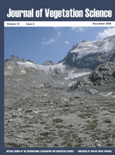
JOURNAL OF VEGETATION SCIENCE
metrics 2024
Cultivating knowledge in the realm of ecology.
Introduction
JOURNAL OF VEGETATION SCIENCE, published by Wiley, stands as a premier platform for disseminating high-quality research within the fields of ecology and plant science. With an impressive rank of #80 out of 516 in Plant Science and #81 out of 461 in Ecology according to Scopus, this esteemed journal is recognized for its significant contributions to advancing knowledge and understanding of vegetation dynamics and biodiversity. Since its inception in 1990, JOURNAL OF VEGETATION SCIENCE has been committed to providing a forum for researchers, professionals, and students to share their findings and engage in critical discussions about the ecological implications of vegetation studies. While this journal does not currently offer open access, it maintains a reputable impact factor, illustrating its importance in contemporary ecological and botanical research. With its Q1 categorization in both Ecology and Plant Science for 2023, it continues to shape and influence the discourse in these disciplines through rigorous peer-reviewed articles, reviews, and synthesis papers.
Metrics 2024
 1.01
1.01 2.20
2.20 2.80
2.80 133
133Metrics History
Rank 2024
Scopus
IF (Web Of Science)
JCI (Web Of Science)
Quartile History
Similar Journals
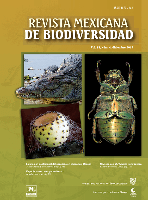
Revista Mexicana de Biodiversidad
Championing Conservation through Innovative ResearchRevista Mexicana de Biodiversidad is a prominent academic journal dedicated to the field of biodiversity and conservation, published by the prestigious Instituto de Biología, Universidad Nacional Autónoma de México. Since its inception as an Open Access publication in 2005, it has aimed to disseminate high-quality research that advances the understanding of biological diversity in Mexico and beyond. With an ISSN of 1870-3453 and an E-ISSN of 2007-8706, the journal caters to a diverse audience, including researchers, professionals, and students, by providing vital insights into ecological studies, conservation strategies, and the sustainable management of natural resources. The journal is committed to fostering scientific collaboration and promoting the significance of biodiversity in addressing contemporary environmental challenges. By publishing innovative and impactful research, the Revista Mexicana de Biodiversidad plays an essential role in the global discourse on biodiversity conservation.

PHYTOCOENOLOGIA
Exploring the Dynamics of Plant CommunitiesPHYTOCOENOLOGIA, published by GEBRUDER BORNTRAEGER, is a prominent journal in the field of Plant Science, holding a prestigious position in the academic landscape with a 2023 Scopus rank of #235 out of 516 in its category, reflecting its contributions to agricultural and biological sciences. Since its inception in 1987, the journal has provided a vital platform for researchers, offering insights and disseminating advances in phytoecology and related disciplines. With its strong commitment to quality, PHYTOCOENOLOGIA is classified in the Q3 quartile, making it a valuable resource for professionals and students alike. The journal welcomes diverse research articles, reviews, and case studies that enhance our understanding of plant communities and their ecological dynamics. Although it operates under a traditional access model, it continues to foster a collaborative environment for scholars eager to explore critical issues in plant science.
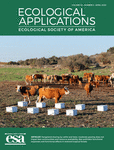
ECOLOGICAL APPLICATIONS
Unveiling the complexities of ecological systems.ECOLOGICAL APPLICATIONS, published by WILEY, is a leading journal in the field of ecology, providing a platform for innovative research that addresses the understanding and management of ecological systems. With an ISSN of 1051-0761 and E-ISSN of 1939-5582, it has established itself as a vital resource for ecologists and environmental scientists since its inception in 1991. Ranked in the top quartile (Q1) for Ecology in 2023 and with a Scopus ranking of 40 out of 461 in Environmental Science, ECOLOGICAL APPLICATIONS boasts an impressive impact factor, attesting to its significance and influence in the field. The journal's mission is to publish peer-reviewed articles that contribute to ecological theory and its applications in conservation and environmental management. Researchers, professionals, and students alike will find invaluable insights and the latest developments in ecological research through its comprehensive scope and rigorous scholarship, ensuring a crucial role in shaping future ecological practices and policies.
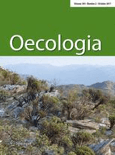
OECOLOGIA
Bridging Disciplines to Illuminate Nature's ComplexitiesOECOLOGIA is a prestigious journal dedicated to the interdisciplinary fields of ecology, evolution, behavior, and systematics, published by Springer. Established in 1968, this journal has consistently contributed to the scientific community, maintaining a strong impact factor reflected in its Q1 ranking within its category for 2023, and an impressive 79th percentile among 721 journals in the Scopus rank for Agricultural and Biological Sciences. With a commitment to advancing ecological knowledge and fostering innovative research, OECOLOGIA serves as a vital platform for researchers, professionals, and students exploring complex ecological dynamics and evolutionary processes. Although it does not offer open access, the journal remains dedicated to high-quality, peer-reviewed publications that inspire and inform the next generation of ecological science. For those interested in the latest trends and significant findings in biology and ecology, OECOLOGIA is an essential resource that continues to shape the discourse and understanding in these critical fields.

OIKOS
Innovative insights into ecological interactions and behaviors.OIKOS is a leading journal dedicated to the field of Ecology, Evolution, Behavior, and Systematics, published by WILEY in the United Kingdom. Since its inception in 1973, OIKOS has established itself as a vital platform for researchers seeking to advance their understanding of ecological interactions and evolutionary processes, with its impact reflected in its prestigious Q1 classification in the 2023 Scopus rankings. The journal's dedication to high-quality research is exemplified by its robust ranking of #106 out of 721 in the relevant categories, situating it within the top 15% of journals globally. With a commitment to disseminating influential findings, OIKOS encourages the open exchange of ideas among a diverse range of scholars, making it an essential resource for academics, professionals, and students alike. Whether you are interested in innovative ecological theories or applied research with real-world implications, OIKOS provides a rich repository of knowledge to inform and inspire your work.

ECOSYSTEMS
Exploring the intricate dynamics of ecosystems.ECOSYSTEMS, an esteemed journal published by SPRINGER, stands at the forefront of ecological research with a distinguished Q1 quartile ranking in multiple categories, including Ecology, Evolution, Behavior and Systematics, and Environmental Chemistry for 2023. Founded in 1998, the journal has become crucial for advancing our understanding of ecosystem dynamics and interactions, offering researchers a platform to disseminate significant findings relevant to ecological health and sustainability. Although Open Access is not available, the journal maintains a robust reputation, evidenced by its high Scopus rankings—placing it within the top 10% in diverse ecological domains. With a publication scope that spans fundamental and applied aspects of ecosystems, ECOSYSTEMS serves as an essential resource for professionals and students pursuing innovative ecological solutions, making it indispensable for contributing to the global conversation on environmental sustainability. For more information, please visit the publisher's site or access your institution's library resources.

ECOLOGICAL RESEARCH
Unraveling the mysteries of nature with cutting-edge research.ECOLOGICAL RESEARCH is a prestigious academic journal published by WILEY, dedicated to advancing the field of ecology and its associated disciplines. Since its inception in 1986, the journal has consistently provided a platform for high-quality, peer-reviewed research, contributing significantly to the understanding of ecological systems and their complexities. With an impressive 2023 impact factor reflected in its Q1 ranking in the category of Ecology, Evolution, Behavior, and Systematics, it stands among the top journals in its field, as evidenced by its Scopus rank of #192 out of 721 and placement in the 73rd percentile. While accessible through standard subscription models, this journal plays an essential role in disseminating crucial findings and innovative methodologies to researchers, professionals, and students alike. With a commitment to fostering ecological knowledge and collaboration, ECOLOGICAL RESEARCH continues to influence ecological practices and policies, shaping the future of research in this critical area.
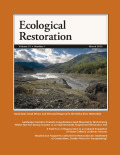
Ecological Restoration
Advancing the science of ecological healing.Ecological Restoration is a renowned journal published by University of Wisconsin Press, focusing on the critical and evolving field of ecological restoration. With its inception dating back to 1999 and converging through the years to 2024, the journal has carved out a significant niche, reflected in its recognition within the Q3 category of Nature and Landscape Conservation for 2023. Although the journal is not readily available as open access, it offers an essential platform for researchers, professionals, and students to publish their findings and collaborate across diverse topics relevant to environmental science and restoration practices. Ranked #123 out of 211 in its Scopus category and positioned in the 41st percentile, Ecological Restoration is dedicated to advancing the dialogue surrounding restoration techniques, ecological health, and sustainability efforts in response to ongoing global environmental challenges. This makes it a vital resource for anyone committed to enhancing the integrity of our natural ecosystems.
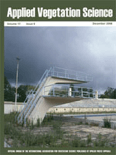
APPLIED VEGETATION SCIENCE
Advancing ecological insights for a sustainable future.Applied Vegetation Science is an esteemed journal published by Wiley, dedicated to advancing the field of vegetation science. With a focus on ecology and nature conservation, this journal serves as a vital resource for researchers, professionals, and policy-makers alike. It holds an impressive Q1 ranking in Ecology and Nature and Landscape Conservation, and a Q2 ranking in Management, Monitoring, Policy and Law, positioning it among the top quartiles of its field as of 2023. The journal, with its ISSN 1402-2001 and E-ISSN 1654-109X, encompasses research spanning from its inception in 1998 to 2024, making it a rich resource for trends and developments in vegetation studies. While it is not currently an open-access publication, Applied Vegetation Science continues to uphold rigorous scientific standards and provides critical insights into managing and preserving ecosystems. Its impactful contributions are reflected in its strong Scopus rankings, solidifying its reputation as a cornerstone publication for the study and management of vegetation.
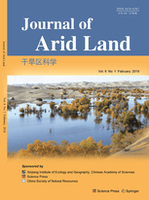
Journal of Arid Land
Bridging research and practice in water science and policy.Journal of Arid Land, published by SPRINGER HEIDELBERG, is a pivotal platform dedicated to advancing knowledge in the fields of Earth-Surface Processes, Management, Monitoring, Policy and Law, and Water Science and Technology. With an ISSN of 1674-6767 and an E-ISSN of 2194-7783, this journal stands out as a prominent source of scholarly research focusing on the unique challenges and opportunities of arid and semi-arid environments, particularly relevant in the context of global climate change. As of 2023, it holds a commendable Q2 ranking in several critical categories, underscoring its impact in environmental science and related disciplines. The journal, which has been in publication since 2009 and is set to continue through 2024, provides unrestricted access to high-quality research that sheds light on sustainable practices and effective policies. With its focus on arid lands, the Journal of Arid Land plays an essential role in fostering interdisciplinary dialogue among researchers, practitioners, and policymakers striving to address the pressing issues faced by these ecosystems.